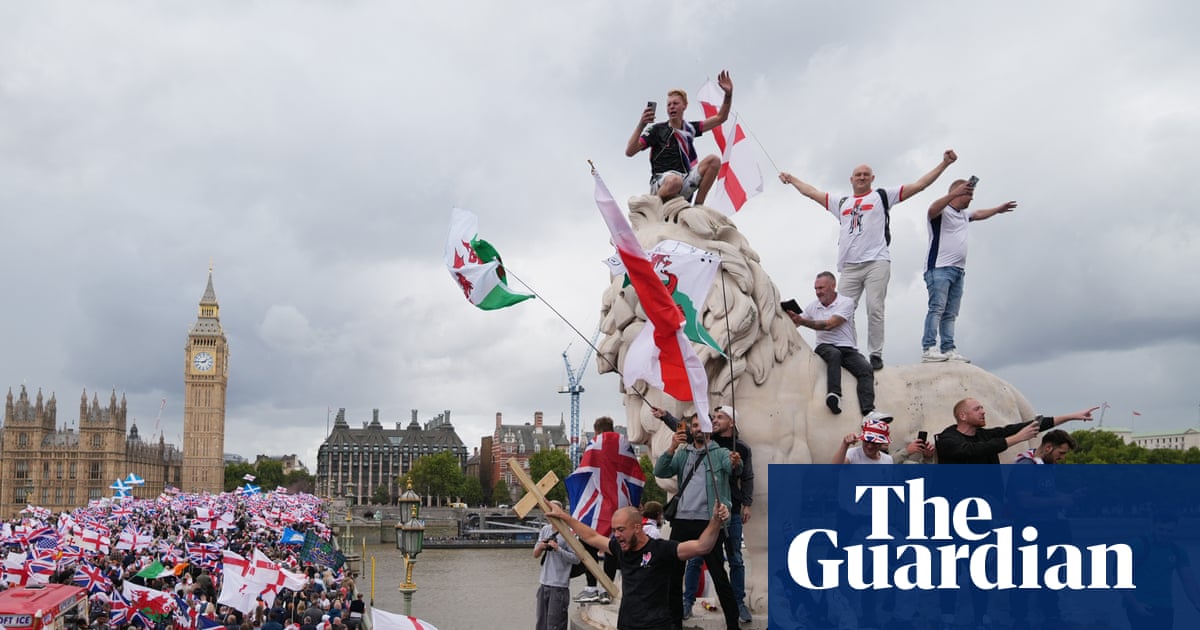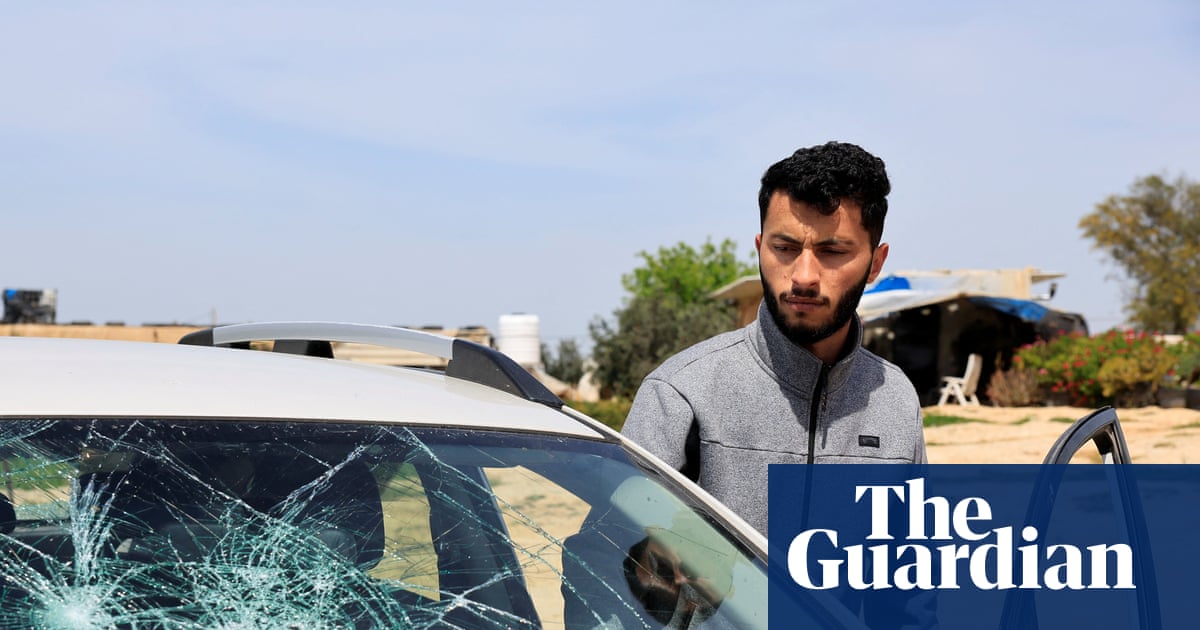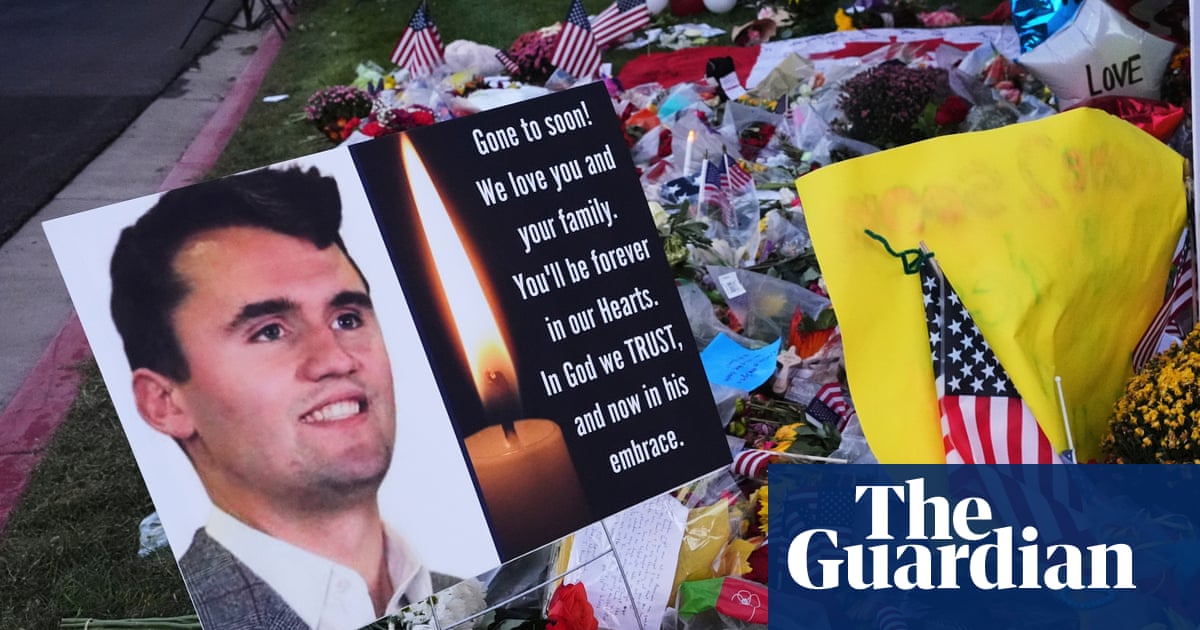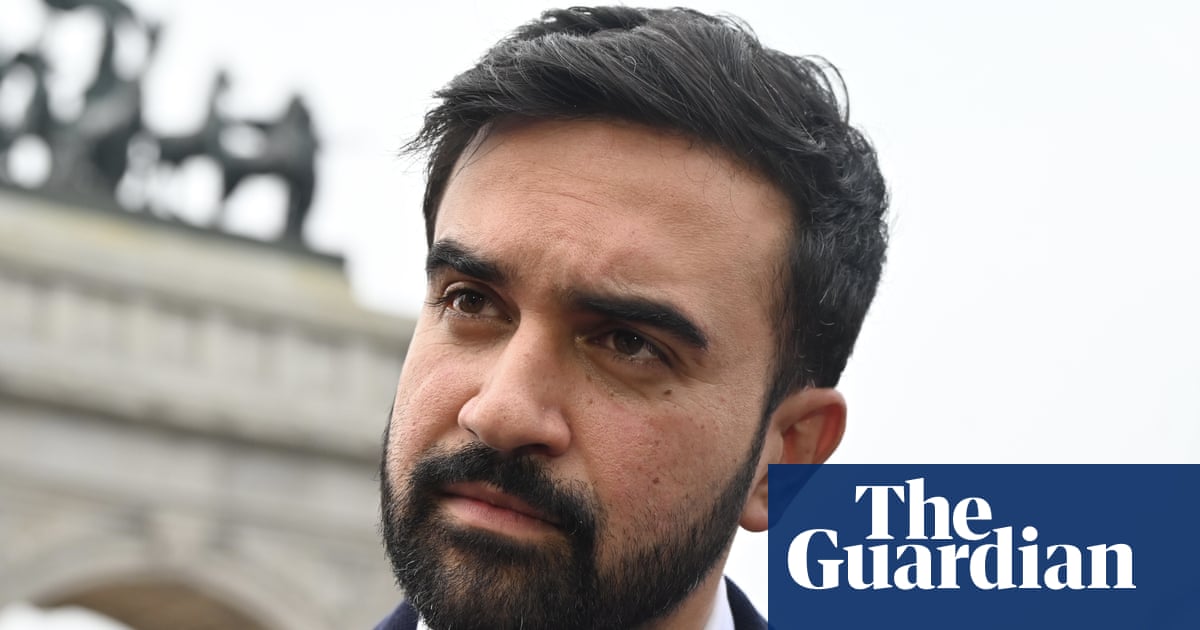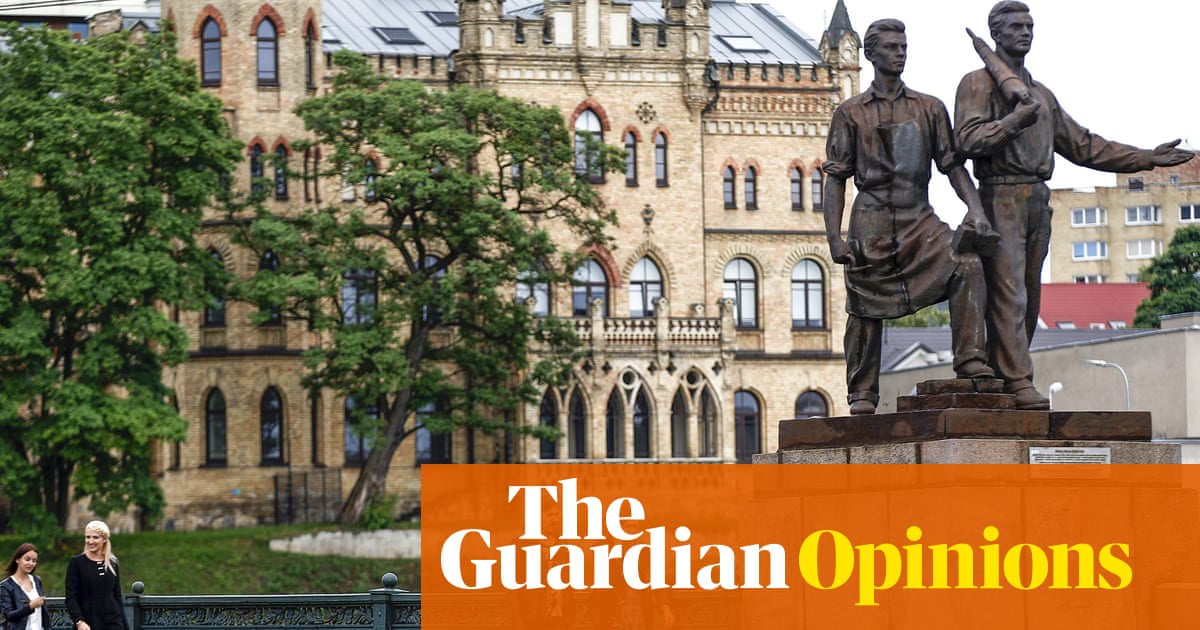Budapest Pride expected to be a rallying cry against Orbán’s rollback of rights
Good morning and welcome to the Europe live blog. My name is Tom Ambrose and I’ll be bringing you all the latest news lines.
We start with news that record numbers of people are expected to take part in Budapest Pride on Saturday. Hungarians will join forces with campaigners and politicians from across Europe in the march that has become a potent symbol of pushback against the Hungarian government’s steady rollback of rights.
“This weekend, all eyes are on Budapest,” Hadja Lahbib, the European commissioner for equality, told reporters in the Hungarian capital on Friday.
“This is bigger than one Pride celebration, one Pride march. It is about the right to be who you are, to love who you want, whether it is in Budapest, in Brussels or anywhere else.”
The country’s main Pride march was cast into doubt earlier this year after the country’s ruling Fidesz party – led by the rightwing populist Viktor Orbán – backed legislation that created a legal basis for Pride to be banned, citing a widely criticised need to protect children.
The government also said it would use facial recognition software to identify people attending any banned events, potentially fining them up to €500 (£425).
The move caused outrage from within Hungary and beyond, turning Budapest Pride into a rallying cry against a government that has long faced criticism for weakening democratic institutions and gradually undermining the rule of law.
Read the full story here:
In other developments:
-
Severe weather warnings have been issued across southern Europe, including in Italy, Spain and Portugal, with temperatures expected to get close to or locally even above 40C this weekend, prompting concerns about health hazards and wildfires (14:32).
-
Expected temperatures on early Saturday afternoon: Madrid 38C, Thessaloníki 38C, Florence 38C, Rome 37C, Lisbon 36C, Tirana 36C, Athens 35C.
-
It will be hot in Paris (32C) and still warm in London and Berlin 28C, and in Brussels 27C.
-
European leaders failed to agree on the latest, 18th, package of sanctions at last night’s European Council meeting in Brussels, with Hungary and Slovakia holding firm in their opposition to the proposed measures.
-
But it’s worth noting that the EU has agreed on rolling over the already existing sanctions against Russia, which were due to expire.
-
In Germany, lawmakers agreed to suspend family reunification rights for refugees without asylum status as conservative chancellor Friedrich Merz’s government pursues a crackdown on immigration.
-
Kremlin spokesperson Dmitry Peskov said that Estonia’s stated intention to let Nato allies’ nuclear-capable aircraft use its territory was a direct threat to Moscow.
Key events Show key events only Please turn on JavaScript to use this feature
Here are some of the first photos in from the Budapest pride match this afternoon…
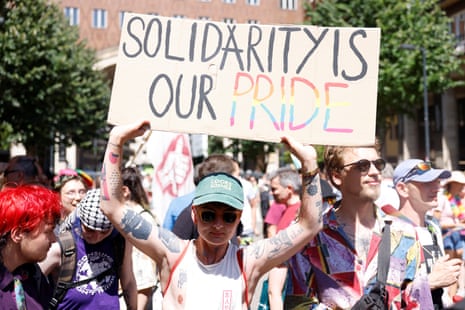
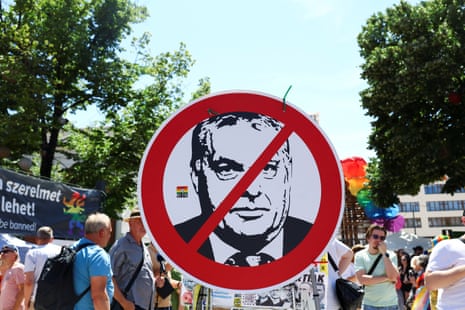
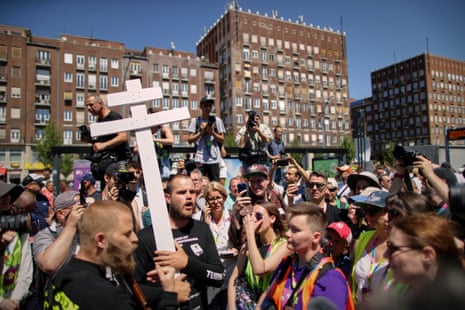
A live feed of the Pride march in Budapest is now available at the top of this blog, you may need to refresh the page to see it there.
You can also watch it here:
Europe on alert as first major heatwave of 2025 pushes temperatures to 42C
Sam Jones
Authorities across Europe are on alert as the first heatwave of the summer pushes temperatures up to 42C (107.6F), as the fastest-warming continent continues to suffer the effects of the climate emergency.
Spain’s state meteorological office, Aemet, issued a special heat warning on Friday, saying temperatures could reach 42C in some southern areas of the country over the coming days.
“Very high and persistent temperatures are expected, both during the day and at night, which could pose a risk to exposed and/or vulnerable people,” Aemet said.
Madrid’s health ministry also warned people to take extra care in the heat, reminding them to stay out of the sun, keep hydrated and pay close attention to those who are older, pregnant or who have chronic health conditions.
Two-thirds of Portugal will be on high alert on Sunday for extreme heat and forest fires as temperatures of up to 42C are expected in Lisbon. As temperatures in Marseille approach 40C, authorities in France’s second-largest city have ordered public swimming pools to be made free of charge to help residents beat the Mediterranean heat.
With peaks of 39C expected in Naples and Palermo, Sicily has ordered a ban on outdoor work in the hottest hours of the day, as has the Liguria region in northern Italy. The country’s trade unions are campaigning to extend the measure to other regions.
In Venice – which has played host to the lavish three-day wedding celebrations of Amazon founder Jeff Bezos and his wife, Lauren Sánchez, guests, visitors and protesters are feeling the heat. “I try not to think about it, but I drink a lot of water and never stay still, because that’s when you get sunstroke,” Sriane Mina, an Italian student, told Agence France-Presse in the city.
Crowds are beginning to gather in Budapest, here are some of the latest images coming through from photographers on the ground…
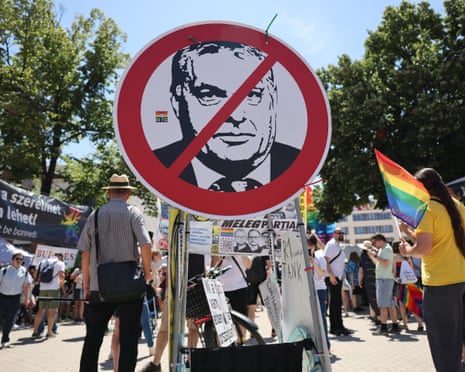
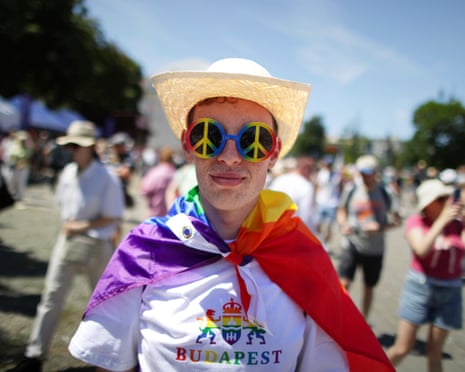

Lunchtime summary
-
Record numbers of people are expected to take part in Budapest Pride on Saturday. Hungarians will join forces with campaigners and politicians from across Europe in the march that has become a potent symbol of pushback against the Hungarian government’s steady rollback of rights. “This weekend, all eyes are on Budapest,” Hadja Lahbib, the European commissioner for equality, told reporters in the Hungarian capital on Friday.
-
Organisers of Budapest Pride, which this year will mark its 30th anniversary, said the government was attempting to restrict peaceful protests by targeting them. “This event was one of the important milestones of the LGBTQ community,” said its spokesperson Máté Hegedüs.
-
Nicolae Ștefănuță, the vice-president of the European parliament, on Friday called on police to respect those attending the Budapest Pride march. “I would like to say that the police and institutions of the state have a duty to protect the citizens,” he said. “It’s as clear as possible.”
-
The European Commission president, Ursula von der Leyen, this week joined calls for Hungarian authorities to allow the event to go ahead. Hungarian prime minister Victor Orbán was swift to hit back, likening it to receiving orders from Moscow in communist times.
-
Weather warnings for this weekend were issued for large parts of the Mediterranean region, with temperatures expected to get above 40 degrees celsius this weekend. AFP reported that in Spain, emergency medical staff readied to deal with an expected surge in heatstroke cases, particularly among vulnerable groups such as children, elderly people and people with chronic illnesses.
-
Polish president Andrzej Duda arrived in Kyiv on Saturday for a meeting with Ukrainian president Volodymyr Zelenskyy, Duda’s office said, as Kyiv aims to build support among allies at a critical juncture in its grinding war with Russia. Duda, a vocal supporter of Ukraine whose term ends in August, was greeted at the train station by foreign minister Andrii Sybiha, who called the Polish leader “Ukraine’s true friend”.
-
Two people were killed and at least 14 wounded when a Russian drone smashed into a residential high-rise in Ukraine’s Black Sea city of Odesa, authorities said on Saturday. Three children were among the wounded in the overnight attack, with one in critical condition, said regional governor Oleh Kiper.
-
Russian forces have taken control of the settlement of Chervona Zirka in Ukraine’s eastern Donetsk region, the Russian defence ministry said on Saturday.
-
Jeff Bezos and Lauren Sánchez are preparing for the last party of their three-day wedding festivities in Venice as demonstrators mobilise for a final protest against the couple’s opulent nuptials in the Italian lagoon city. The Amazon founder, 61, and the former TV journalist, 55, exchanged vows in front of around 200 celebrity guests in a black-tie ceremony on the nearby island of San Giorgio Maggiore on Friday evening.

Lisa O'Carroll
The EU must come up with a more assertive response to the humanitarian catastrophe in Gaza and the violations of international law, the bloc’s former chief diplomat has said.
In a strongly worded article, Josep Borrell said the EU had a “duty” to intervene and must come up with its own concerted plan to end the war instead of relying on the US.
“Europe can no longer afford to linger at the margins,” he said in the article that was co-authored with Kalypso Nicolaïdis, an occasional adviser to the EU and professorial chair in international affairs at the Florence school of transnational governance at the European University Institute. “The EU needs a concerted plan.
“Not only is Europe’s own security at stake, but more important, European history imposes a duty on Europeans to intervene in response to Israel’s violations of international law,” they say, adding: “Europeans cannot stay the hapless fools in this tragic story, dishing out cash with their eyes closed.”
Here is a map outlining the Budapest pride march route…
The Associated Press has more on that overnight drone strike in Odesa, Ukraine:
Two people died and at least 17 more were injured as Russian drones overnight struck the southern Ukrainian port city of Odesa, Ukrainian authorities said on Saturday.
A drone slammed into a residential tower block in the city, causing damage to three floors and trapping residents, emergency services said.
The two killed in the attack were a married couple, according to regional governor Oleh Kiper, who added that three children were among the injured.
There was no immediate comment from Moscow. According to Russia’s defense ministry, over 40 Ukrainian drones were shot down overnight and on Saturday morning, over western Russia and Kremlin-occupied Crimea.
The German government seeks to speed up defence procurement by simplifying legal procedures, fostering European cooperation and facilitating orders to start-ups to make its military combat-ready, according to a draft law seen by Reuters late on Friday.
The speedy surge of the German military’s capabilities “must not fail due to overly complex procurement procedures or lengthy authorisation processes”, the document said, while warning of signs that Moscow’s war objectives reach beyond Ukraine.
At a Nato summit in The Hague, leaders on Wednesday agreed to hike the alliance’s defence spending target to 5% of national GDP, with 3.5% dedicated to core defence and 1.5% to related security issues.
German chancellor Friedrich Merz’s government on Tuesday approved a budget framework which is expected to see Berlin’s total military spending rise from 95 billion euros in 2025 to 162 billion euros in 2029, equalling 3.5% of GDP.
The new defence procurement law is part of efforts to speed up military purchases that in the past have been plagued by lengthy delays, project failures and cost overshoots.
The draft law determines that all procurement that contributes to Europe and Nato’s military readiness inherently touches upon vital national security, which constitutes a basis to invoke an exemption under European public procurement law.
Sam Jones
Jeff Bezos and Lauren Sánchez are preparing for the last party of their three-day wedding festivities in Venice as demonstrators mobilise for a final protest against the couple’s opulent nuptials in the Italian lagoon city.
The Amazon founder, 61, and the former TV journalist, 55, exchanged vows in front of around 200 celebrity guests in a black-tie ceremony on the nearby island of San Giorgio Maggiore on Friday evening.
According to reports, the pair had originally planned that Saturday’s final party would be held at Scuola Grande della Misericordia, a majestic 16th-century building in the city centre, but were forced to change venues after activists threatened to fill the canals with inflatable crocodiles to block their celebrity guests from entering.
The main wedding reception will instead be staged in the Arsenale, a historic complex of shipyards surrounded by fortified walls.
The couple’s guests include Bill Gates, Leonardo DiCaprio, Oprah Winfrey, Kim Kardashian, Ivanka Trump, Tom Brady and Orlando Bloom.
Protesters - who have already coordinated a variety of imaginative demonstrations under the “No Space for Bezos” platform - are planning a march at 5pm from the railway station to the Rialto bridge. They argue that the celebrations risk turning the world heritage site, which has long suffered from the effects of excessive tourism, into a playground for the rich.
The city’s authorities, however, have welcomed the attention and the money it is bringing.
“Those who protest are in contradiction with the history of Venice, which is a history of relations, contacts and business,” Luigi Brugnaro told Reuters.
“Bezos embodies the Venetian mentality, he is more Venetian than the protesters.”
Russia says it has taken control of settlement of Chervona Zirka in eastern Ukraine
Russian forces have taken control of the settlement of Chervona Zirka in Ukraine’s eastern Donetsk region, the Russian defence ministry said on Saturday.
Reuters could not independently verify the battlefield report.
Two people were killed and at least 14 wounded when a Russian drone smashed into a residential high-rise in Ukraine’s Black Sea city of Odesa, authorities said on Saturday.
Three children were among the wounded in the overnight attack, with one in critical condition, said regional governor Oleh Kiper.
Footage posted by the State Emergency Service showed firefighters battling a blaze and rushing residents down a dark stairwell in the 21-storey building, Reuters reported.
Russia has stepped up drone and missile strikes on Ukrainian cities in recent weeks as diplomatic efforts to end the nearly three-and-a-half-year-old war have stalled.
Poland's Duda arrives in Ukrainian capital Kyiv to meet Zelenskyy
Polish president Andrzej Duda arrived in Kyiv on Saturday for a meeting with Ukrainian president Volodymyr Zelenskyy, Duda’s office said, as Kyiv aims to build support among allies at a critical juncture in its grinding war with Russia.
Duda, a vocal supporter of Ukraine whose term ends in August, was greeted at the train station by foreign minister Andrii Sybiha, who called the Polish leader “Ukraine’s true friend”.
Ukraine is struggling to fend off Russian advances on the battlefield and intensifying missile and drone attacks on its cities as diplomatic efforts to end the war, now in its fourth year, have faltered.
Duda’s successor, president-elect Karol Nawrocki says he remains committed to helping Ukraine’s defence effort but opposes Kyiv joining Western alliances such as Nato.

Miranda Bryant
After 19 years of commuting to Denmark from Sweden, Helen Sjögren is so used to crossing the bridge that she identifies as Scandinavian rather than Swedish.
The researcher at a Danish pharmaceutical company lives in the Swedish university town of Lund with her three children but has become accustomed to Danish working practices, and the idea of working in Sweden is now difficult to imagine.
“Because I’m Swedish, colleagues would expect me to behave like a Swede,” she said, referring to their reputation for seeking consensus. “So I would be seen as rude – too direct to fit in Sweden.”
Danes, she has found, are more forthright. “I really like the Danish mentality and way of being. It suits me much better.”
“I really like the Danish mentality and way of being. It suits me much better.” At work, she and her colleagues speak slightly adapted versions of Swedish and Danish so that everybody can understand one another.
One of her few misgivings is that her taxes go to Copenhagen rather than her own municipality, where her children have gone to school and where she uses the healthcare services.
In the quarter of a century since it opened on 1 July 2000, the bridge – known as Øresundsbroen or Öresundsbron depending on whether you are on the Danish or Swedish side of the eponymous strait – has not only opened up Copenhagen’s vast job market to largely rural southern Sweden, but changed the prospects and even identities of many who use it.
The 15.9km (9.9 miles) rail and road link between Copenhagen and Malmö (which includes an 8km bridge, 4km tunnel and 4km artificial island) has also transformed the world’s perception of the region.
But the trajectory of the two ends of the bridge has been a story of two halves. Copenhagen has soared to international super status, becoming a must-see tourist destination, global fashion and design leader, host to the biggest airport in the Nordics, as well as being home to the maker of Ozempic, Novo Nordisk.
Thanks to the weak Swedish krona, it has become a magnet for Swedish workers, bringing in 2bn DKK (£230m) a year in tax revenues. Last year 105,000 daily journeys were made by car, train or boat over the strait, but most commuter traffic is travelling towards Denmark.
Southern Europe on heat alert as temperatures expected to hit 40 degrees celsius
Weather warnings for this weekend were issued for large parts of the Mediterranean region, with temperatures expected to get above 40 degrees celsius this weekend.
AFP reported that in Spain, emergency medical staff readied to deal with an expected surge in heatstroke cases, particularly among vulnerable groups such as children, elderly people and people with chronic illnesses.
In neighbouring Portugal, the national meteorological agency IPMA said the heatwave would hit from Saturday, with temperatures passing 40C in the south of the country as well as in the central Tagus and the Douro valleys in the north, AFP said.
21 cities in Italy were put on red alert warning, too, including Rome, Milan and Venice, with people told not to leave their homes between 11am and 6pm.
Florence is also expected to see temperatures up to 37 degrees celsius on Saturday. Greece is also getting ready to face the heatwave, with a meteoalert warning about temperatures expected to hit low 40s.
The European Commission president, Ursula von der Leyen, this week joined calls for Hungarian authorities to allow the event to go ahead.
Hungarian prime minister Victor Orbán was swift to hit back, likening it to receiving orders from Moscow in communist times.
“She thinks she can dictate to Hungarians from Brussels how they should live,” he said in a radio interview.
The widespread pushback, both domestic and international, had seemingly done little to dissuade the Hungarian government. This week, the country’s justice minister, Bence Tuzson, appeared to warn embassy staff from attending the event.
“The legal situation is clear: the Pride parade is a legally banned assembly,” he said in a letter seen by the Guardian. “Those who take part in an event prohibited by the authorities commit an infraction,” he said, adding that those organising or announcing the event faced up to a year in prison.
The progressive mayor of Budapest, Gergely Karácsony, has said the gathering will instead go ahead as a municipal event, meaning it will not require official authorisation.
Nicolae Ștefănuță, the vice-president of the European parliament, on Friday called on police to respect those attending the Budapest Pride march.
“I would like to say that the police and institutions of the state have a duty to protect the citizens,” he said. “It’s as clear as possible.”
The sentiment was echoed in a petition, signed by more than 120,000 people spanning 73 countries, that called on police to “reject this unjust law” – believed to be the first of its kind in the EU’s recent history – and ensure that the march proceeded “unhindered and peacefully, free from discrimination, harassment, fear or violence”.
Despite uncertainty, tens of thousands of Hungarians are expected to take part.
Joining them will be politicians and rights campaigners from more than 30 countries, including Ireland’s former taoiseach Leo Varadkar, Spain’s minister of culture, Ernest Urtasun, more than 70 members of the European parliament, and the mayors of Brussels and Amsterdam.
Organisers of Budapest Pride, which this year will mark its 30th anniversary, said the government was attempting to restrict peaceful protests by targeting them.
“This event was one of the important milestones of the LGBTQ community,” said its spokesperson Máté Hegedüs.
“Our slogan this year is that we are at home. By this, we want to draw attention to the fact that LGBTQ people are an integral part of Hungarian society, just as any other people. In our history, in our culture, this is where we belong.”
Hours before the march was due to begin, however, uncertainty loomed over how officials would react.
While prime minister Victor Orbán has said that those who attend or organise the march will face “legal consequences”, he said Hungary was a “civilised country” and police would not “break it up … It cannot reach the level of physical abuse”.
Budapest Pride expected to be a rallying cry against Orbán’s rollback of rights
Good morning and welcome to the Europe live blog. My name is Tom Ambrose and I’ll be bringing you all the latest news lines.
We start with news that record numbers of people are expected to take part in Budapest Pride on Saturday. Hungarians will join forces with campaigners and politicians from across Europe in the march that has become a potent symbol of pushback against the Hungarian government’s steady rollback of rights.
“This weekend, all eyes are on Budapest,” Hadja Lahbib, the European commissioner for equality, told reporters in the Hungarian capital on Friday.
“This is bigger than one Pride celebration, one Pride march. It is about the right to be who you are, to love who you want, whether it is in Budapest, in Brussels or anywhere else.”
The country’s main Pride march was cast into doubt earlier this year after the country’s ruling Fidesz party – led by the rightwing populist Viktor Orbán – backed legislation that created a legal basis for Pride to be banned, citing a widely criticised need to protect children.
The government also said it would use facial recognition software to identify people attending any banned events, potentially fining them up to €500 (£425).
The move caused outrage from within Hungary and beyond, turning Budapest Pride into a rallying cry against a government that has long faced criticism for weakening democratic institutions and gradually undermining the rule of law.
Read the full story here:
In other developments:
-
Severe weather warnings have been issued across southern Europe, including in Italy, Spain and Portugal, with temperatures expected to get close to or locally even above 40C this weekend, prompting concerns about health hazards and wildfires (14:32).
-
Expected temperatures on early Saturday afternoon: Madrid 38C, Thessaloníki 38C, Florence 38C, Rome 37C, Lisbon 36C, Tirana 36C, Athens 35C.
-
It will be hot in Paris (32C) and still warm in London and Berlin 28C, and in Brussels 27C.
-
European leaders failed to agree on the latest, 18th, package of sanctions at last night’s European Council meeting in Brussels, with Hungary and Slovakia holding firm in their opposition to the proposed measures.
-
But it’s worth noting that the EU has agreed on rolling over the already existing sanctions against Russia, which were due to expire.
-
In Germany, lawmakers agreed to suspend family reunification rights for refugees without asylum status as conservative chancellor Friedrich Merz’s government pursues a crackdown on immigration.
-
Kremlin spokesperson Dmitry Peskov said that Estonia’s stated intention to let Nato allies’ nuclear-capable aircraft use its territory was a direct threat to Moscow.

 2 months ago
34
2 months ago
34

